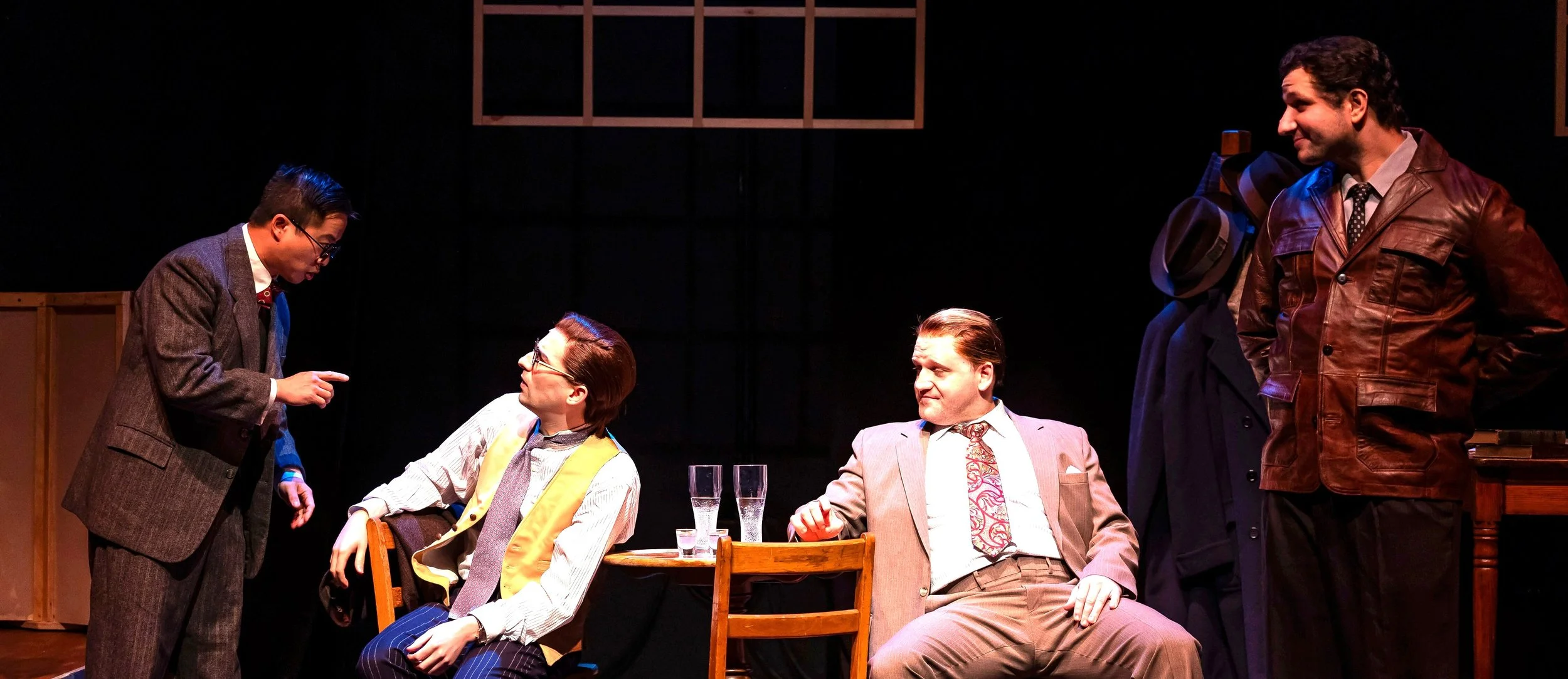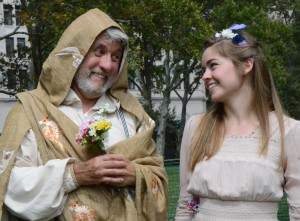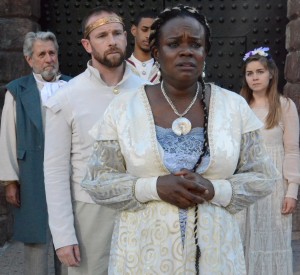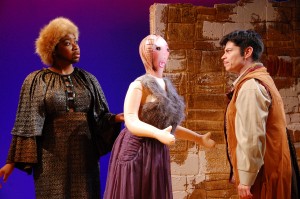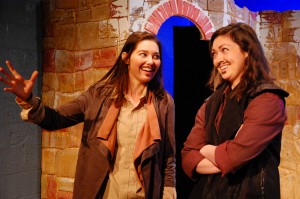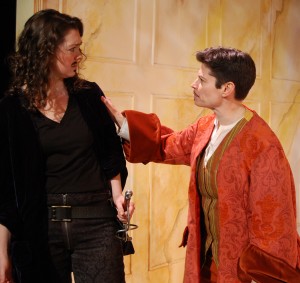A superb company of actors, the Arlekin Players Theatre, is in residence at Classic Stage Company (CSC) with The Merchant of Venice. The energetic production on CSC’s Lynn F. Angelson stage, however, may come as a jolt to playgoers fond of Shakespeare’s play.
A Midsummer Night’s Dream
A Midsummer Night’s Dream, streamlined to 90 minutes and staged outdoors by Classical Theatre of Harlem, is as cool and fizzy as a glass of Prosecco. Judging by the wild guffaws and applause on opening night, the zanies who populate this most fanciful of Shakespeare’s comedies (embodied by a top-flight cast of youthful New York actors) kept a steady hold on playgoers’ attention, despite the distraction of sirens punctuating the Bard’s iambic pentameter, helicopters overhead, and heat only slightly below the day’s high of 90 degrees Fahrenheit. At a dramatic moment, an explosion of amateur fireworks just outside the amphitheater added a fortuitous burst of red and orange to the twilit sky, eliciting a gasp of audience amusement.
Richard III
In William Shakespeare’s Richard III, the title character is a hunchback whose anger is fueled because he feels like an outcast. His quest for power becomes a form of revenge. Under Robert O’Hara’s direction, Richard III for the Public Theater is loose and playful. Actress Danai Gurira, in the gender-swapped title role, is sinewy and tiger-like. As Richard, she pounces, manipulates, smiles, grins, and grimaces: a shape-shifter who manipulates others.
American Moor
Keith Hamilton Cobb has written a thrilling part for himself in American Moor, a powerful look at Shakespeare, Othello, and the plight of black actors trying to pursue their craft with honesty. Cobb himself stars, although his character in the script is called the Actor. The play arrives at a moment when race and white privilege dominate the zeitgeist. Some of the material is familiar, but much is unique and insightful.
Coriolanus
Shakespeare’s tragedy of Coriolanus isn’t often done—Daniel Sullivan’s production at the Delacorte Theater in Central Park is the first in that venue in 40 years. But Sullivan’s staging is not only for Shakespeare completists. It’s a brilliant rendering, crowned by a towering performance from Jonathan Cake in the title role.
Uncle Romeo Vanya Juliet
Bedlam, the estimable theater company founded in 2012, has a reputation for reinvigorating classic texts with a combination of raw energy and incisive interpretation. At its best, Bedlam distills a work to its bare essence using a small cast to reveal the play’s soul, which apparently had always been hiding in plain sight. Their production of Saint Joan, for instance, employed just four actors and revealed the vigor and immediacy within Shaw’s verbosity. The same four actors performed Hamlet as a giddy romp that also succeeded in finding new depths of pathos and urgency. And their adaptation of Sense and Sensibility managed to plumb the theatricality from Jane Austen’s 19th-century novel with 21st-century showmanship.
Bedlam’s latest production, Uncle Romeo Vanya Juliet, described in the show’s publicity as a mash-up of Uncle Vanya and Romeo and Juliet, takes a different approach. Rather than burrowing into the separate plays for new subtextual insights, the adaptation by Kimberly Pau looks outside of the texts for inspiration. The dramaturgical merging attempts to show how the classic works complement each other through their über-textual parallels. The final result, unfortunately, is as ungainly as the show’s title. The production ultimately numbs Chekhov’s aching anguish and neuters Shakespeare’s romantic poetry.
Susannah Millonzi as Sonya and Eric Tucker as Astrov in Kimberly Pau’s Uncle Romeo Vanya Juliet. Top: Zuzanna Szadkowski as Yelena/Juliet and Edmund Lewis as Vanya/Romeo.
Actually, the mash-up designation is rather misleading. While one might expect this appellation to be a classical cocktail mixed with equal parts Vanya and equal parts Romeo and Juliet, the primary focus is essentially on the former. Pau has provided a script that is a generally faithful version of Chekhov’s play with just two eliminated characters (Vanya’s mother and Sonya’s former nanny), but the rest of the existentially afflicted individuals are all present.
For the first two thirds of Uncle Romeo Vanya Juliet, directed by Eric Tucker, audiences can expect a fairly straightforward interpretation of Chekhov’s masterwork. For those unfamiliar with the plot, the lives of Vanya (Edmund Lewis) and Sonya (Susannah Millonzi) are thrown into turmoil with the arrival of Sonya’s father and pedantic professor, Serebryakov (Randolph Curtis Rand), and his young wife, Yelena (Zuzanna Szadkowski). Astrov (Tucker), the neighboring doctor and dabbler in botany, has become a permanent fixture in the home, and his passionate love for Yelena wreaks emotional havoc on the household.
Vanya also loves Yelena, and both Sonya and Yelena love Astrov, and although no one dies as a result of star-crossed passions, their fates are even worse: except for the haughty professor, the characters will presumably live in eternal misery and loneliness.
In Bedlam fashion the proceedings are punctuated with cheeky anachronisms and choreographed chaos. When Vanya threatens Serebryakov with a gun, for example, the characters scream that he is “going postal,” and Yelena has a momentary daydream/dance break underscored by the 1980s lovers’ anthem, “Total Eclipse of the Heart.” Moments of emotional turmoil are highlighted with actors forcefully rolling set pieces into and out of the playing space. (John McDermott’s scenic design, which playfully creates a Russian estate with moveable birch trees, office furniture, and an iconic samovar, is spot-on.)
Tucker and Szadkowski. Photographs by Ashley Garrett.
The Romeo and Juliet tangents offer little in the way of emotional or intellectual illumination. At times, there are moments of cleverness, such as in a reference to Vanya’s dream. This prompts Astrov to metamorphose into Mercutio and recite his well-known Queen Mab monologue. There is also an extended riff late in the play in which Vanya fantasizes about killing Serebryakov, and the characters assume an alternative reality. Vanya/Romeo and Yelena/Juliet are romantically tragic in ways that undercuts the quotidian tragedy that Chekhov presents.
If the amalgamation does not effectively serve Chekhov’s and Shakespeare’s works, the five-member ensemble (with an on-stage musician, John Coyne, who masterfully accompanies the cast in periodic Russian folksongs) tears into the material. Alternating between rough-and-tumble acting and broad comedy, each actor also has quiet moments to show the sense of solitude just under the surface.
Les Dickert’s impressive lighting (with a special nod to the birch trees with red fairy lights) and Charlotte Palmer-Lane’s mix of contemporary and period-inflected costumes (including putting Yelena/Juliet in a white wedding dress for most of the second act) provide a waking dreamlike quality to the proceedings.
Chekhov purists might be more inclined to see the current production of Uncle Vanya across town at Hunter College. Richard Nelson’s spare, quiet production seems more radical in its simplicity. The Bedlam production needlessly and regrettably complicates the play with its infusion of dramatic schizophrenia.
Uncle Romeo Vanya Juliet plays through Oct. 28 at A.R.T./New York Theatres Mezzanine Theatre, 502 W. 53rd St. Evening performances are at 7 p.m. Tuesday and Thursday through Saturday; matinees are at 2 p.m. Wednesday, Saturday and Sunday. For a performance calendar and tickets, visit bedlam.org.
Henry VI
Three productions of Henry VI, William Shakespeare’s seldom staged trilogy, have cropped up Off-Off Broadway since January. The latest, by the ambitious National Asian American Theatre Company (NAATCO), brings epic pageantry and violence to the intimate Mezzanine space at the A.R.T./New York complex on West 53rd Street.
Wars of the Roses: Henry VI & Richard III
Two years ago New York theatergoers had the opportunity to see Kings of War, Ivo Van Hove’s compilation of five Shakespearean history plays. Tracing the royal lineage of Henry V through Henry VI and ending with Richard III (with a few additional coronations in between), Van Hove’s four-hour-plus production was a grand, sweeping, and technologically sophisticated epic. Working on a much smaller scale, director, adaptor, and actor Austin Pendleton has created his own synthesis of the battles between the Houses of Lancaster and York for Wars of the Roses: Henry VI & Richard III, which is currently playing at the 124 Bank Street Theatre. A mashup of Shakespeare’s Henry VI, Part 3 and Richard III and running a mere three hours, Pendleton’s adaptation offers its fair share of both theatrical rewards and pitfalls.
King Lear
In 1940 British critic James Agate said of John Gielgud’s King Lear: “I do not feel that this Lear’s rages go beyond extreme petulance—they do not frighten me!” No such reservation afflicts Gregory Doran’s intelligent and well-spoken Royal Shakespeare Company production, which stars Antony Sher as the king—the Shakespearean role that Sher, who last year played Falstaff at BAM, says will be his last.
Twelfth Night
The Fiasco Theater production of Twelfth Night is energetic, clearly spoken and firmly middle-of-the-road. The company, with standard members, must try to cast every actor in a part, even if the requirements are slightly off. In Shakespeare’s story of twins, a brother and sister, who are shipwrecked in a foreign country, Illyria, where they have amorous mix-ups before they are reunited, an audience may notice that Emily Young’s slender Viola bears little resemblance to Javier Ignacio’s chunkier Sebastian, apart from wearing glasses and a ribbed, russet sweater, though it’s unlikely that will spoil one’s enjoyment.
Makbet
It’s always an adventure sitting down to watch Shakespeare. Where will this production send its viewers? To what time period or country? Will it be set in a fast-food restaurant or trying to stay as close to a traditional production as possible? The Dzieci Theatre company has taken a risk with its recent production of Makbet, a gypsy-infused performance of Shakespeare’s Macbeth, directed by Matt Mitler. The play is presented in a shipping container in the back of a junkyard in Bushwick, Brooklyn. Although it is an uncomfortable place to ask audience members to sit, the underlit and claustrophobic quarters alert the audience immediately to the darkness of the play.
Measure for Measure
Measure for Measure (1604) has long been considered one of Shakespeare’s problem plays. Partly it’s because of corruptions in the printing, but also, as a purported “comedy,” it’s never fully satisfying. In the right director’s hands, though, it can be deeply intriguing and memorable.
Hamlet
Waterwell’s production of Hamlet is probably not for the first-timer to Shakespeare’s masterpiece. Under director Tom Ridgely, the tragedy has been reset in Iran of the early 20th century rather than Denmark of the 1500s. Parts of the play are spoken in Farsi, and if, for instance, you didn’t know what Hamlet’s father’s Ghost says to him, you’re going to be out of luck, since the physically and vocally formidable Barzin Akhavan speaks entirely in Farsi. Other passages require familiarity with the play to be understood, notably Hamlet’s exchange with Ophelia about lying in her lap during The Murder of Gonzago, or Hamlet’s crucial plan to insert lines of his own. (The last, however, is covered by some English dialogue later, but until that arises, a new listener would be confused.)
Hamlet. A Version
Boris Akunin’s Hamlet. A Version reimagines Shakespeare’s classic tale of political intrigue as a multi-layered murder mystery. Akunin, a Russian writer best known for his Sherlock Holmes–like character Fandorin, which has a cult following, does not write just for thrills. His Hamlet is a tragedy but also a whodunit.
Othello
Star wattage backed up by first-rate acting gives Sam Gold’s production of Othello a must-see status. Indeed, one suspects that without the celebrity power, Shakespeare’s rarely staged tragedy might have taken even longer to reappear on the boards. (John Douglas Thompson gave a superb interpretation in a traditional production back in 2009, although there is currently a rap version, Othello: The Remix, playing in midtown.)
Othello: The Remix
As one of Shakespeare’s most famed tragedies, Othello has seen quite a number of adaptations over the years. The artistic duo Q Brothers take their stab at adapting this timeless play with Othello: The Remix, which discards Shakespeare’s original iambic pentameter in favor of modern rhyme set to rap music. In the spirit of Hamilton and other sung-through and hip-hop-infused musicals, Othello: The Remix is 80 minutes of fast-paced lyricism—spun live by cast member DJ Supernova and with hardly a breath in between. While there are a few questionable production choices, the massive amount of creative energy and impressive talent on display in Othello: The Remix make it hard to resist.
Coriolanus
The playbill for the Red Bull production of Shakespeare’s rarely staged Coriolanus gives the time period as "Rome, 493 B.C.E. Here, now." But, under Michael Sexton’s direction, the latter prevails: military men in camouflage fatigues and dress greens, a First Citizen with a T-shirt that reads “You can’t have capitalism without racism,” and several female soldiers all declare it’s now. There’s virtually nothing identifiable from 493 B.C.E.
A Civic Jewel—and Free!
There is something appropriate about offering Shakespeare for free in the parks of New York City. Like the great rivers and mountains of the earth or the stars and planetary system—which charge no admission for us to admire them—Shakespeare is a force of Nature that belongs to us all.
Artistic Director Stephen Burdman has made it the mission of the New York Classical Theatre to bring free Shakespeare productions to various parks during the summer: following this year’s production of A Midsummer Night’s Dream is the late romance The Winter’s Tale, brilliantly conceived, acted, and deeply moving, to boot.
The Winter’s Tale, first performed 405 years ago in 1611, is about the fallout of a king’s jealousy when the ruler, Leontes, wrongly imagines that his devoted wife, Hermione, has consorted with his best friend, King Polixenes, and that the child she is to bear him is not his. Only after the death of Leontes’ young son and sole heir, Mamillius (Peyton Lusk is delightful in the role), followed by the death of his faithful queen, does the king awaken from his madness and see his foul crimes for what they are.
Here is a feast of self-deception, delusion and jealousy for Shakespeare to plumb in all of the pity and horror his majestic language can inspire before the play resolves, after an improbable leap of 16 years in time, on happier notes: the reunion of the two friends, Leontes and Polixenes; the forthcoming marriage of their children, Florizel and Perdita; and most ridiculously wondrous of all, the revelation that the statue of the long-dead queen is really a living and breathing Hermione, now returned to the bosom of her husband and family. If the question is whether or to what extent a particular performance of The Winter’s Tale allows the audience to utterly suspend their disbelief when confronted by such leaps in time and “happy” endings, the production did very well indeed.
Brad Fraizer in his beautifully acted role as Leontes carries the emotional sweep of the play from his increasingly insane jealousy to the extremes and horror of recognition of his crimes, and from there to the reconciliations wrought by Time and Chance. It is a challenging role.
David Heron as his beloved childhood friend, King Polixenes, is commanding and passionate in his role. Hermione, so profoundly wronged by her husband, is portrayed by Mairin Lee with a queenly elegance, dignity and sensitivity. Mark August, who plays the clown, Autolycus, is extraordinary and deserves special mention for his comic brilliance and gifts. So, too, does the stirring performance of Lisa Tharp as Paulina, maid in waiting to the Queen, whose impassioned rebuke to Leontes for his treatment of his wife is heart-piercing. For all of the loveliness of the outdoor setting, it also places special demands in clearly projecting Shakespeare’s language, to which the cast rose magnificently.
As the play moves from Act II to Act III, the audience also moves—from Clinton Castle (Leontes’ court in Sicilia) to a lawn overlooking the Hudson River (the shores of Bohemia). Burdman calls this his “panoramic” technique, a method by which the audience is less a witness to the actions before it than at the center of those actions. It is as if the viewers were really accompanying the courtier Antigonus, sent by the mad Leontes to abandon his own newborn daughter, Perdita. Over the Hudson, just in front of the audience, is a real cloud-flecked sky with real birdsong mixing with the sounds of the city in the background. Scene iii of the next act takes place on a different lawn (another location in Bohemia) to which the actors, again, lead the audience. The scene is one of a sheep shearing and, as evening gathers, the audience sits amid trees and grass exactly as they might at a real sheep shearing.
In Burdman’s “panoramic” approach, the entire park is our stage. There are no sets. Scenes are acted in different areas of the park with the audience sitting on the ground or grass, and the staff, in the first row of the audience, shining flashlights on the characters once it has become dark. Shakespeare’s language and his dramatic exploration of human character and heart fill the entirety of the space with no theatrical paraphernalia to draw off attention. And the effect is simply stunning, as less proves so much more! There is no lovelier way to spend an evening than to allow Shakespeare’s magic to sizzle and cast a net over you and over the city itself.
Meet outside Castle Clinton in Battery Park at 7 p.m. nightly (except Thursdays) through Aug. 7 (via 1 train to South Ferry or the 4/5 to Bowling Green). The Winter’s Tale will then move to Brooklyn Bridge Park from Aug. 9-14 (take F train to York, 2/3 to Clark or A/C to High), also at 7 p.m. There will be no performance on Aug. 11.
Breaking Gender Barriers in ‘Shrew’
New York theater is known for challenging the status quo, and that is what the Queen’s Company is all about—breaking down barriers by creating gender-blind performances of the classics and reaching out to a broader, more diverse community in its perspective on those classics, in particular Shakespeare. Artistic director Rebecca Patterson’s vision shows she understands that Shakespeare transcends time and place. His characters represent all of humanity and hit at a deeper core—the truly humane one. Because every actor was cast according to how her personality fit the role, not according to gender, the production is an organic ensemble theatrical experience.
Patterson, a Lucille Lortel Award winner, is an actor’s director. Every moment in the play was active, honest and alive with brilliance. Having the role of Bianca played by the lovely Sweetie Doll (a blow-up sex doll) was a hysterically funny touch. In that single choice, Patterson shows one of the most important themes of the play—women’s oppression by men’s control of sexuality. Choices in music that fit key moments of the performance further heighten that theme and the emotional tension of this famous love story. Particularly funny yet thought-provoking was the pantomime of a Tina Turner song performed by Petruchio’s motley servants, led by Ashley Samona Baker as Grumio. As they perform, Katharina fights her shrewish instincts to be right. The lyrics and their playful performance reveal the inner conflict of that moment when Kate breaks and realizes she is fighting a losing battle.
The cast is perfect. The entire ensemble deserves praise for playing multiple roles with ease. Elizabeth Preston as Petruchio was spot on. Catherine Dalton as Hortensio was delightful in her Brant Russell physicality. Their playful interaction was reminiscent of Orlando Bloom and Johnny Depp in Pirates of the Caribbean. But Preston was no overacting pirate; she was more like Depp in Chocolat—sexy, sensitive, cool. She captured Petruchio’s arrogance and willfulness, but also his vulnerability. Preston reveals Petruchio’s genuine respect and interest in Katharina when Petruchio reflects on how Katharina aggressively deals with Hortensio as the ill-fated music instructor: “Now, by the world, it is a lusty wench. I love her ten times more than e'er I did.” Preston’s performance breaks the gender barriers, yet nothing is overstated or falsely posed. In her direction, Patterson has shown the true meaning of Petruchio and Katharina’s relationship—they represent all the nuances of falling in love and giving oneself over completely to another.
Tiffany Abercrombie is a stoic Katharina, creating a mother of the modern woman. The chemistry between Petruchio and Katharina is crucial to this play, and these two sensual interpretations reveal perhaps a more honest point Shakespeare was making—that love is not a prideful battle but a partnership made from love and respect. Under Patterson’s thoughtful direction, Abercrombie’s heartfelt confession as Katharina, as she infamously reprimands women, becomes more a proclamation of true love. And Petruchio’s response becomes that of a repentant faithful lover.
Their final kiss truly is a declaration of respectful love. It no longer is an issue of man’s will against woman’s but more about how wonderful love can be when it is with the mate who is a perfect match. Patterson’s interpretation gives Shakespeare’s play a fairy-tale ending of renewed faith in love, not a battle of wills and submission.
The set, lighting and costuming were simple and basic, with a dance of colors rich with textured fabrics of wool, fur, and velvet fully enhancing the raw beauty of the time and place of this wonderful play. Muted blue lighting against the brown wools and furs for the servants, the burgundy velvet for Baptista, and the bold red lace for Katharina mirrored the emotions of the characters but also reflected the barriers of caste and class.
Patterson’s talented entourage of technical artists worked seamlessly within her artistic vision. Set designer Angelica Borrero, lighting designer Alberto Ruiz, costume designer Elizabeth Flores and sound designer Beth Lake created an atmosphere that set the tone and playful mood of this timeless story. Patterson and her troupe really honored Shakespeare and all he represents in theatrical history. For Shakespeare lovers, this is a must-see production.
The Queen’s Company’s The Taming of the Shrew runs through May 1 at the Wild Project (195 East 3rd St., between Avenues A and B). Performances are at 8 p.m. Tuesday through Saturday and at 3 p.m. on Sunday. Tickets are available by calling (866) 811-4111. Tickets are 2-for-1 on Tuesday nights. For information, visit http://QueensCompany.org.
Q&A: The Queen’s Company’s ‘Shrew’ Is on Message
The very notion or necessity of taming an outspoken, independent woman—or a shrew—is about as offensive as it gets. It’s a criticism Shakespeare came up against even in his time, so any production today must partly run afoul of such discussion. But Rebecca Patterson has been directing the play long enough to know better. Having first done Taming of the Shrew in 2005 and having workshopped it for the last few years, she’s secure in the knowledge that Shakespeare always moves “toward the light” and doesn’t worry that the real message will be lost.
OffOffOnline: What is your interpretation of The Taming of the Shrew?
Rebecca Patterson: Shakespeare is a humanist. He has extreme compassion for people who are getting the short end of the stick, so this is not a battle of the sexes. It’s about marriage and the oppression that happens at the most intimate of places, which is in our hearts and our bedrooms. On the other hand, he’s also extremely honest, and writing in a misogynistic time. This meant he explored his world but still hoped to shift domination and submission in relationships on a path toward egalitarianism.
OffOffOnline: Are we allowed to laugh?
Patterson: That’s what’s so amazing about the play. It’s dark, it’s dangerous, and it’s funny. Of course, the situation Katherina is caught in is not funny. But one of the most empowering things you can do is laugh or tell a joke. So there are points that are hilarious, but the one thing that is often ignored is the Bianca story. What I’ve done—given the expectations for her suitors—was have her played by a—
OffOffOnline: By what?
Patterson: A blow-up doll.
OffOffOnline: Oh, really.
Patterson [laughing]: Exactly. A blow-up doll is perfect, because she’s what everybody wants her to be.
OffOffOnline: Does she speak?
Patterson: That’s what made it so easy to lift out her lines. She doesn’t really affect anybody and doesn’t have any effect. So people talk around her, but she does speak at the end because even the blow-up doll finds her voice.
OffOffOnline: What are you trying to get across by using an all-female cast?
Patterson: Nothing. One of the things that I’ve found is contemporary women are better able to channel the Renaissance male reality, which is emotionally accessible and strong. Still, Shakespeare is all about humanity—not necessarily men and women. So if we do an all-female cast, it resonates simply as human.
OffOffOnline: Why do you think women have better access?
Patterson: Because contemporary men from a young age are taught not to show their emotion, but the Renaissance man must have a fully expressed emotional life to understand Shakespeare’s journeys. You have to see into their souls, and that degree of inner transparency is easier for contemporary women.
OffOffOnline: How else do you diverge from the original?
Paterson: Shakespeare is like a diamond: there are so many difference facets. But I am true to the words that are spoken. The only thing is I have streamlined some scenes because the theatrical expectations are different from the audience. Still, people always ask if I keep the final scene where Katherina lays out the expectation that women had to be subservient. That’s what he wrote. Shakespeare was being honest, but the play doesn’t end there. We take a modern context. For anybody who’s been caught in a marriage of subservience, there’s a journey that still needs to be taken—especially for the dominator to get to a place where they can truly love.
OffOffOnline: Was Shakespeare the only one who wrote in rhyme?
Patterson: They all wrote that way at the time. It was thought that the elevated speech was how you unleashed the human heart. Shakespeare was just the one who did it best.
OffOffOnline: What if you don’t necessarily speak Shakespeare. Can you still enjoy this?
Patterson: My actors are extremely talented and well trained classical actors. So people walk out of our play, and say, “I’m impressed how you updated the language.” But we don’t. The trick is you have to find the rhythms of the language. I liken it to rap. So we make him strut, and the consonants and vowels actually reach inside of us to play our hearts.
OffOffOnline: How do you see your role as a director?
Patterson: My actors see the text as I do, so all I do is guide them to places where there might be a misinterpretation. It’s less about doing it wrong, and more about “There’s something else here” or “I don’t think this is what the moment is about.”
Tickets can be purchased by calling OvationTix at (866) 811-4111 or online at web.ovationtix.com/trs/cal/621/1459483200000. The Taming of the Shrew runs through May 1 at the Wild Project (195 East 3rd St. between Avenues A and B) in Manhattan.
Performances are at 8 p.m. Tuesday through Saturday and 3 p.m. on Sunday.



